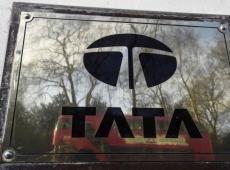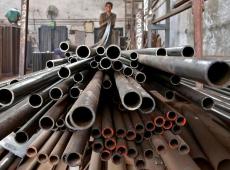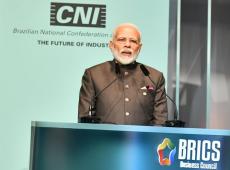EU Carbon Tax Won't Help Indian Firms: GTRI
By Rediff Money Desk, New Delhi Jul 31, 2024 11:38
GTRI says EU's carbon tax will not benefit Indian companies as they will still face duty for exports. It suggests India implement its own tax or use a retaliatory mechanism.
New Delhi, Jul 31 (PTI) The EU's suggestion that India could avoid its carbon tax by imposing a similar levy locally will not help the domestic players much, as they would still be liable for the duty for their exports to the European Union, think tank GTRI said on Wednesday.
The main issue is that carbon prices are usually based on a country's economic situation, so simply adding a local tax would not reduce the overall tax burden significantly, the Global Trade Research Initiative (GTRI) said.
While the EU (European Union) can afford high carbon prices, it may not be sustainable for a developing country like India, it said.
Further explaining, it said at present, the global average carbon price is around USD 6 per tonne of CO2 and if India were to establish an Emissions Trading System (ETS) or set a carbon price, it is expected to be less than USD 10 per tonne of CO2.
Even with such a system, Indian firms would still need to pay the EU the difference amounting to USD 51.3 per tonne of CO2 under the Carbon Border Adjustment Mechanism (CBAM).
The EU has decided to impose a CBAM, or carbon tax, which will come into effect from January 1, 2026, but from October this year, domestic companies from seven carbon-intensive sectors, including steel, cement, fertiliser, aluminium and hydrocarbon products, would have to share data with regard to carbon emissions with the EU.
According to the think tank, the EU-CBAM when fully implemented will result in a 20-35 per cent import tax on Indian firms and the domestic industry will have to share all plant and production details with the EU.
"Also, large firms may need to run two production lines. Expensive yet greener for making products for exports to EU countries and normal products for the rest of the world. CBAM will disrupt world trade in a big way," it said.
India has strongly criticised the move and is in dialogue with the EU on the issue.
In a recent meeting, the EU delegation led by Gerasimos Thomas, Director-General for Taxation and Customs Union of the European Commission, proposed that India implement its own carbon tax to support greener supply chains while ensuring continued access to the European Union market.
The EU's CBAM regulation offers a reduction in the tax payable to the EU if a product has already been taxed for its carbon emissions in its home country. The EU delegation suggests that Indian exports could potentially avoid or reduce the CBAM taxes if India implements a carbon tax system, charging exporters for their carbon emissions domestically.
The GTRI also said that setting higher carbon prices say above USD 10 per tonne of CO2 in India could have several negative effects.
"It would increase production costs for industries like steel and aluminium that rely heavily on fossil fuels, leading to higher prices for goods and services. This could also make Indian firms less competitive compared to those in countries with lower or no carbon pricing," GTRI Founder Ajay Srivastava said.
He said that industries with high carbon emissions might cut jobs or shut down if they cannot handle the higher costs, causing potential job losses.
To deal with the issue, the GTRI suggested usage of a Calibrated Retaliation Mechanism (CRM) to retaliate in equal measure.
"We have done it before. In March 2018, when the US imposed import tariffs on India's steel and aluminium, India responded by increasing tariffs on 29 specific US products. This retaliation involved precise calculations, ensuring that India collected equivalent revenue from US products as the US did from Indian steel and aluminium," Srivastava said.
He added that the CRM offers several advantages, including rapid implementation and India can easily adjust product lists and tariff levels to mirror the actions of the EU or any other partner country precisely.
Moreover, it is essential to recognise that CBAM is just one of several schemes that could negatively affect Indian exports. The EU has also introduced the Deforestation Regulation, Foreign Subsidies Regulation (FSR), and Supply Chain Due Diligence Act (SCDDA).
"CRM, if adopted, could be used to counteract the impact of these schemes on Indian exports," he said adding India can also rename specific existing levies as carbon taxes to reduce final tax paid at EU.
India imposes import and excise duties on petroleum products and natural gas, along with GST on items like coal, steel, and aluminium.
The country can officially designate these as carbon taxes, specifically for steel and aluminium, it said.
"Under this approach, the carbon tax paid by a company in India can be offset when calculating the tax due in the EU. This adjustment would ultimately reduce the total tax liability for the firm. It is crucial to design this scheme using internationally accepted norms to ensure acceptance by the EU," it added.
The main issue is that carbon prices are usually based on a country's economic situation, so simply adding a local tax would not reduce the overall tax burden significantly, the Global Trade Research Initiative (GTRI) said.
While the EU (European Union) can afford high carbon prices, it may not be sustainable for a developing country like India, it said.
Further explaining, it said at present, the global average carbon price is around USD 6 per tonne of CO2 and if India were to establish an Emissions Trading System (ETS) or set a carbon price, it is expected to be less than USD 10 per tonne of CO2.
Even with such a system, Indian firms would still need to pay the EU the difference amounting to USD 51.3 per tonne of CO2 under the Carbon Border Adjustment Mechanism (CBAM).
The EU has decided to impose a CBAM, or carbon tax, which will come into effect from January 1, 2026, but from October this year, domestic companies from seven carbon-intensive sectors, including steel, cement, fertiliser, aluminium and hydrocarbon products, would have to share data with regard to carbon emissions with the EU.
According to the think tank, the EU-CBAM when fully implemented will result in a 20-35 per cent import tax on Indian firms and the domestic industry will have to share all plant and production details with the EU.
"Also, large firms may need to run two production lines. Expensive yet greener for making products for exports to EU countries and normal products for the rest of the world. CBAM will disrupt world trade in a big way," it said.
India has strongly criticised the move and is in dialogue with the EU on the issue.
In a recent meeting, the EU delegation led by Gerasimos Thomas, Director-General for Taxation and Customs Union of the European Commission, proposed that India implement its own carbon tax to support greener supply chains while ensuring continued access to the European Union market.
The EU's CBAM regulation offers a reduction in the tax payable to the EU if a product has already been taxed for its carbon emissions in its home country. The EU delegation suggests that Indian exports could potentially avoid or reduce the CBAM taxes if India implements a carbon tax system, charging exporters for their carbon emissions domestically.
The GTRI also said that setting higher carbon prices say above USD 10 per tonne of CO2 in India could have several negative effects.
"It would increase production costs for industries like steel and aluminium that rely heavily on fossil fuels, leading to higher prices for goods and services. This could also make Indian firms less competitive compared to those in countries with lower or no carbon pricing," GTRI Founder Ajay Srivastava said.
He said that industries with high carbon emissions might cut jobs or shut down if they cannot handle the higher costs, causing potential job losses.
To deal with the issue, the GTRI suggested usage of a Calibrated Retaliation Mechanism (CRM) to retaliate in equal measure.
"We have done it before. In March 2018, when the US imposed import tariffs on India's steel and aluminium, India responded by increasing tariffs on 29 specific US products. This retaliation involved precise calculations, ensuring that India collected equivalent revenue from US products as the US did from Indian steel and aluminium," Srivastava said.
He added that the CRM offers several advantages, including rapid implementation and India can easily adjust product lists and tariff levels to mirror the actions of the EU or any other partner country precisely.
Moreover, it is essential to recognise that CBAM is just one of several schemes that could negatively affect Indian exports. The EU has also introduced the Deforestation Regulation, Foreign Subsidies Regulation (FSR), and Supply Chain Due Diligence Act (SCDDA).
"CRM, if adopted, could be used to counteract the impact of these schemes on Indian exports," he said adding India can also rename specific existing levies as carbon taxes to reduce final tax paid at EU.
India imposes import and excise duties on petroleum products and natural gas, along with GST on items like coal, steel, and aluminium.
The country can officially designate these as carbon taxes, specifically for steel and aluminium, it said.
"Under this approach, the carbon tax paid by a company in India can be offset when calculating the tax due in the EU. This adjustment would ultimately reduce the total tax liability for the firm. It is crucial to design this scheme using internationally accepted norms to ensure acceptance by the EU," it added.
Source: PTI
DISCLAIMER - This article is from a syndicated feed. The original source is responsible for accuracy, views & content ownership. Views expressed may not reflect those of rediff.com India Limited.
You May Like To Read
TODAY'S MOST TRADED COMPANIES
- Company Name
- Price
- Volume
- GTL Infrastructure
- 2.89 (+ 4.71)
- 121757816
- G V Films
- 0.91 (+ 2.25)
- 76902965
- Srestha Finvest
- 2.26 (+ 4.63)
- 55617757
- Vodafone Idea L
- 16.11 (+ 0.75)
- 46855004
- Suzlon Energy Ltd.
- 71.44 (+ 4.98)
- 30765378
MORE NEWS

Warren Buffett Cuts Apple Stake: Berkshire...
Warren Buffett's Berkshire Hathaway slashed its Apple stake in the second quarter,...

Infosys GST Notice: DGGI Closes Rs 3,898 Cr...
Infosys received a Rs 3,898 crore GST notice for 2017-18 from the DGGI, but the agency...

Tax System Simplification: Govt Committed to...
India's Revenue Secretary highlights the government's commitment to simplifying the tax...












 © 2024 Rediff.com India Limited. All rights reserved.
© 2024 Rediff.com India Limited. All rights reserved.